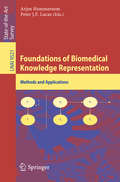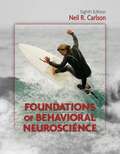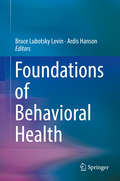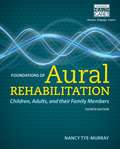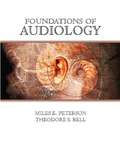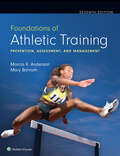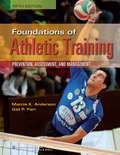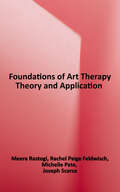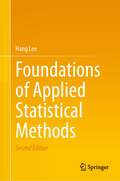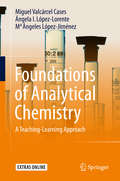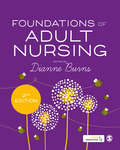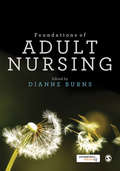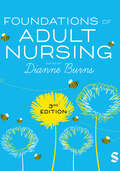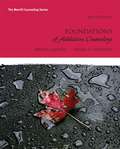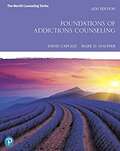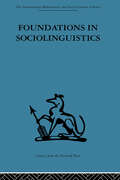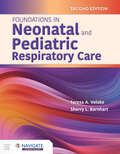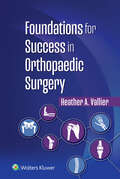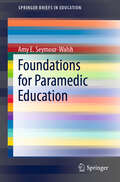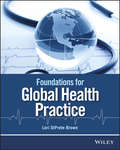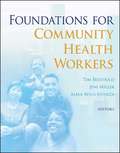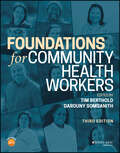- Table View
- List View
Foundations of Biomedical Knowledge Representation
by Arjen Hommersom Peter J.F. LucasMedicineand health care are currently faced with a significant rise in theircomplexity. This is partly due to the progress made during the past threedecades in the fundamental biological understanding of the causes of health anddisease at the molecular, (sub)cellular, and organ level. Since the end of the1970s, when knowledge representation and reasoning in the biomedical fieldbecame a separate area of research, huge progress has been made in thedevelopment of methods and tools that are finally able to impact on the waymedicine is being practiced. Eventhough there are huge differences in the techniques and methods used bybiomedical researchers, there is now an increasing tendency to share researchresults in terms of formal knowledge representation methods, such asontologies, statistical models, network models, and mathematical models. Asthere is an urgent need for health-care professionals to make better decisions,computer-based support using this knowledge is now becoming increasingly important. It may also be the only way to integrate research results from the differentparts of the spectrum of biomedical and clinical research. Theaim of this book is to shed light on developments in knowledge representationat different levels of biomedical application, ranging from human biology toclinical guidelines, and using different techniques, from probability theoryand differential equations to logic. The book starts with two introductorychapters followed by 18 contributions organized in the following topicalsections: diagnosis of disease; monitoring of health and disease andconformance; assessment of health and personalization; prediction and prognosisof health and disease; treatment of disease; and recommendations.
Foundations of Behavioral Neuroscience (Eighth Edition)
by Neil R. Carlson'Foundations of Behavioral Neuroscience' offers a briefer, sixteen chapter introduction to the foundations of physiology, incorporating the latest studies and research in the rapidly changing fields of neuroscience and physiological psychology.
Foundations of Behavioral Health
by Bruce Lubotsky Levin Ardis HansonThis comprehensive book examines the organization, financing, delivery, and outcomes of behavioral health (i.e., alcohol, drug abuse, and mental health) services from both U.S. and global perspectives. Addressing the need for more integrative and collaborative approaches in public health and behavioral health initiatives, the book covers the fundamental issues in behavioral health, including epidemiology, insurance and financing, health inequities, implementation sciences, lifespan issues, cultural responsiveness, and policy.Featuring insightful research from scholars in an interdisciplinary range of academic and professional fields, chapters fall into three distinct sections:Overview: Outlines the defining characteristics of behavioral health services and identifies significant challenges in the fieldAt-Risk Populations: Explores critical issues for at-risk populations in need of behavioral health services, including children in school environments, youth in juvenile justice systems, and persons with developmental disabilities, among othersServices Delivery: Presents a rationale for greater integration of health and behavioral health services, and contextualizes this explanation within global trends in behavioral health policy, systems, and servicesAn in-depth textbook for graduate students studying public health, behavioral health, social work policy, and medical sociology, as well as a useful reference for behavioral health professionals and policy makers, Foundations of Behavioral Health provides a global perspective for practice and policy in behavioral health. It promotes better understanding of the importance of integrating population health and behavioral health services, with an eye towards improving and sustaining public health and behavioral health from national, regional, and global perspectives.
Foundations of Aural Rehabilitation: Children, Adults, and their Family Members, Fourth Edition
by Nancy Tye-MurrayFOUNDATIONS OF AURAL REHABILITATION: ADULTS, CHILDREN, AND THEIR FAMILY MEMBERS, 4th Edition introduces the fundamentals of rehabilitative audiology and hearing-related speech-language pathology in an easy-to-read style, along with concrete suggestions that help you deliver high-quality services. Designed for both classroom learners and as a reference for seasoned professionals, this widely-used book entwines theory with clinical practice, and presents research-based information for identifying, diagnosing, and treating hearing and communication-related disorders. I Important topics include patient-centered services, counseling, selection and fitting of listening devices, conversational fluency and communication strategies training, auditory training, speechreading, and language and speech promotion. Divided into sections to cover adult and child populations separately, the book distills readings into important "Take Home" points, and illustrates with representative research reports, case studies, example procedures, and lively figures. Text box inserts, sidebar bullet points, tables, and quotes from professionals and patients also pique interest, along with key resources and appendices for clinical practice or self-study.
Foundations of Audiology: A Practical Approach
by Theodore S. Bell Miles E. PetersonFundamentals of Audiology is a concise alternative that presents the basic aspects of audiology and audiometry in one streamlined resource. Ideal for practitioners in speech-language pathology, nursing, or other health care professions, this new book provides a review of the audiology profession, the basics of sound, coverage of normal hearing function, and the causes and effects of hearing loss. With over 100 figures, pictures, and graphs, it provides a thorough explanation of audiometry, screening programs, and special procedures for difficult-to-test populations. A separate chapter summarizing rehabilitation and approaches to intervention is also included.
Foundations of Athletic Training: Prevention, Assessment, and Management
by Marcia Anderson Mary BarnumComprehensive and evidence-based, Foundations of Athletic Training, 7th Edition, integrates basic medical concepts and related scientific information to help readers develop a strong foundation in athletic training best practices. The text’s practical, problem-solving approach to the prevention, recognition, assessment, management, and disposition of sports-related injuries and diseases helps students learn to think like practitioners. Fully aligned with the BOC competencies, the 7th Edition has been extensively updated, expanded, and reorganized to reflect the changing role of today’s athletic trainer and includes a powerful suite of engaging learning tools to help students succeed.
Foundations of Athletic Training: Prevention, Assessment, and Management (Fifth Edition)
by Marcia K. Anderson Gail P. ParrThis text integrates basic medical concepts and related scientific information to provide a strong foundation of general athletic training practices. Using a problem-solving approach to prevention, recognition, assessment, management, and disposition of sports-related injuries and diseases, this text provides athletic trainers and athletic training students with the most extensive, challenging content in a user-friendly format. New Content -- This edition features a new chapter on Psychological Intervention Strategies.
Foundations of Art Therapy: Theory and Applications
by Meera Rastogi Rachel P. Feldwisch Michelle Pate Joseph ScarceThis is an essential and comprehensive introduction to the field of art therapy that blends relevant psychological and neuroscience research, theories, and concepts and infuses cultural diversity throughout each chapter. <p><p>The text includes full color photos, informative charts, and case examples and is divided into four parts beginning with the basics of art therapy knowledge and concluding with professional practices in art therapy. The fundamentals of art therapy section includes coverage of art therapy founders, art materials, multicultural perspectives, intersections with neuroscience, and research methods. <p><p>An overview and in-depth explorations of different theoretical approaches to the practice of art therapy are covered in the second part of the book. A bio-psycho-social approach integrates current research on art therapy with specific populations (children, mental health, older adults, and trauma). <p><p>The book concludes with art therapy professional practices in group concepts, community-based art therapy, and developing a career in the field. Each chapter contains chapter objectives, practical applications, ethical considerations, reflection questions, experiential exercises, and a list of terms. The unique, practical, and interdisciplinary approach of this text provides a solid base for understanding the field of art therapy and is well suited for use in undergraduate art therapy courses. This book will appeal to those who want an introduction to the field's theories, research, and practice and those seeking a comprehensive understanding on the foundations of art therapy.
Foundations of Applied Statistical Methods
by Hang LeeThis book covers methods of applied statistics for researchers who design and conduct experiments, perform statistical inference, and write technical reports. These research activities rely on an adequate knowledge of applied statistics. The reader both builds on basic statistics skills and learns to apply it to applicable scenarios without over-emphasis on the technical aspects. Demonstrations are a very important part of this text. Mathematical expressions are exhibited only if they are defined or intuitively comprehensible.This text may be used as a guidebook for applied researchers or as an introductory statistical methods textbook for students, not majoring in statistics. Discussion includes essential probability models, inference of means, proportions, correlations and regressions, methods for censored survival time data analysis, and sample size determination.
Foundations of Analytical Chemistry
by Miguel Valcárcel Cases Ángela I. López-Lorente Ma Ángeles López-JiménezThis book offers a completely new approach to learning and teaching the fundamentals of analytical chemistry. It summarizes 250 basic concepts of the field on the basis of slides. Each of the nine chapters offers the following features:• Introduction: Summary. General scheme. Teaching objectives.• Text containing the explanation of each slide.• Recommended and commented bibliography.• Questions to be answered.• Slides. A distinct feature of this novel book is its focus on the fundamental concepts and essential principles of analytical chemistry, which sets it apart from other books presenting descriptive overviews of methods and techniques.
Foundations of Adult Nursing
by Dianne BurnsCovering the issues, themes and principles that explain what it means to be a nurse today, this book provides the theory students need to know and applies it to the diverse patient groups and settings that students will encounter on their placements. Key features of the book are: It introduces the core aspects of adult nursing An evidence-based approach with discussion of literature, policy and research and suggested further reading for every chapter Over 30 case studies to help students understand the realities of practice across a range of settings including primary care and the community Stop and think boxes which challenge assumptions and encourage reflection A companion website with sample questions for lecturers to use in seminars, multiple choice questions for student revision and free SAGE journal articles The book has been closely mapped to the NMC's 2018 Standards for Proficiency, Education and Training and supports students across their entire degree programme as they develop into nurses of the future ready to deliver and lead care.
Foundations of Adult Nursing
by Dianne BurnsCovering the issues, themes and principles that explain what it means to be a nurse today, this book provides the theory students need to know and applies it to the diverse patient groups and settings that students will encounter on their placements. Key features of the book are: · Introduces the core aspects of adult nursing · An evidence-based approach with discussion of literature, policy and research and suggested further reading for every chapter · Over 30 case studies to help students understand the realities of practice across a range of settings including primary care and the community · Stop and think boxes which challenge assumptions and encourage reflection · A companion website with sample questions for lecturers to use in seminars, multiple choice questions for student revision and free SAGE journal articles The book has been closely developed in line with the NMC Standards and Essential Skills Clusters and supports students across their entire degree programme as they develop into nurses of the future ready to deliver and lead care.
Foundations of Adult Nursing
by Dianne BurnsCovering the issues, themes and principles that explain what it means to be a nurse today, this book provides the theory students need to know and applies it to the diverse patient groups and settings that students will encounter on their placements. Key features of the book are: · Introduces the core aspects of adult nursing · An evidence-based approach with discussion of literature, policy and research and suggested further reading for every chapter · Over 30 case studies to help students understand the realities of practice across a range of settings including primary care and the community · Stop and think boxes which challenge assumptions and encourage reflection · A companion website with sample questions for lecturers to use in seminars, multiple choice questions for student revision and free SAGE journal articles The book has been closely developed in line with the NMC Standards and Essential Skills Clusters and supports students across their entire degree programme as they develop into nurses of the future ready to deliver and lead care.
Foundations of Adult Nursing
by Dianne BurnsCovering the issues, themes and principles that explain what it means to be a nurse today, this book provides the theory students need to know and applies it to the diverse patient groups and settings that students will encounter on their placements. Key features of the book are: It introduces the core aspects of adult nursing An evidence-based approach with discussion of literature, policy and research and suggested further reading for every chapter Over 30 case studies to help students understand the realities of practice across a range of settings including primary care and the community Stop and think boxes which challenge assumptions and encourage reflection A companion website with sample questions for lecturers to use in seminars, multiple choice questions for student revision and free SAGE journal articles The book has been closely mapped to the NMC's 2018 Standards for Proficiency, Education and Training and supports students across their entire degree programme as they develop into nurses of the future ready to deliver and lead care.
Foundations of Adult Nursing
by Dianne BurnsCovering the issues, themes and principles that explain what it means to be a nurse today, this book provides the theory you need to know and applies it to the diverse patient groups and settings that you will encounter on your placements. Key features of the book are: · Introduces the core aspects of adult nursing · An evidence-based approach with discussion of literature, policy and research and suggested further reading for every chapter · Over 30 case scenarios to help you understand the realities of practice across a range of settings including primary care and the community · Activity boxes which challenge assumptions and encourage reflection The book has been closely developed in line with the latest NMC Standards and Essential Skills Clusters and supports you across your entire degree programme as you develop into nurses of the future ready to deliver and lead care.
Foundations of Adult Nursing
by Dianne BurnsCovering the issues, themes and principles that explain what it means to be a nurse today, this book provides the theory you need to know and applies it to the diverse patient groups and settings that you will encounter on your placements. Key features of the book are: · Introduces the core aspects of adult nursing · An evidence-based approach with discussion of literature, policy and research and suggested further reading for every chapter · Over 30 case scenarios to help you understand the realities of practice across a range of settings including primary care and the community · Activity boxes which challenge assumptions and encourage reflection The book has been closely developed in line with the latest NMC Standards and Essential Skills Clusters and supports you across your entire degree programme as you develop into nurses of the future ready to deliver and lead care.
Foundations of Addictions Counseling (Second Edition)
by David Capuzzi Mark D. StaufferA practical collection of tools and strategies for prospective addictions counselors that includes a solid foundation of research, theory, and history. Practical and comprehensive,Foundations of Addiction Counseling explores an array of techniques and skills that a new practitioner will need in the real world while providing a thorough review of the research, theory, and history of addiction counseling. With chapters written by expert scholars, this text covers many topics in-depth often ignored by other comparable books, such as professional issues in addictions counseling, the assessment of client strengths, gender issues in substance abuse, working in rehabilitation centers, and working with clients with disabilities. The second edition of this unique text offers prospective counselors the tools and strategies they will need for working with general and special populations, including assessment tools, strategies for outpatient and inpatient treatment, information about maintenance and relapse prevention, and counseling strategies for couples, families, children, adolescents, college students, and recovering addicts. The revised edition includes expanded discussions on a number of topics, new case studies, and completely updated resources and web references.
Foundations of Addictions Counseling (Merrill Counseling Series)
by David Capuzzi Mark StaufferA practical collection of tools and strategies for prospective addictions counselors that includes a solid foundation of research, theory, and history. <p><p>Practical and comprehensive, Foundations of Addiction Counseling explores an array of techniques and skills that a new practitioner will need in the real world while providing a thorough review of the research, theory, and history of addiction counseling. With chapters written by expert scholars, this text covers many topics in depth often ignored by other comparable books, such as multiple chapters on cross-cultural counseling, professional issues in addictions counseling, the assessment of client strengths, gender issues in substance use, working in rehabilitation centers, and working with clients with disabilities. <p><p> Combining practice, research, and theory, the 4th Edition of this unique text offers students the tools and strategies they need for successful practice. The revised edition includes new case studies, extended discussion in the chapters dedicated to substance and process addictions (Chs. 2-3), a thoroughly updated chapter on maintenance and relapse prevention (Ch. 13), and an expanded chapter on substance use and families (Ch 14).
Foundations in Sociolinguistics: An ethnographic approach (Conduct And Communication Ser.)
by Dell HymesTavistock Press was established as a co-operative venture between the Tavistock Institute and Routledge & Kegan Paul (RKP) in the 1950s to produce a series of major contributions across the social sciences. This volume is part of a 2001 reissue of a selection of those important works which have since gone out of print, or are difficult to locate. Published by Routledge, 112 volumes in total are being brought together under the name The International Behavioural and Social Sciences Library: Classics from the Tavistock Press. Reproduced here in facsimile, this volume was originally published in 1977 and is available individually. The collection is also available in a number of themed mini-sets of between 5 and 13 volumes, or as a complete collection.
Foundations in Neonatal and Pediatric Respiratory Care
by Teresa A. Volsko Sherry BarnhartAdvances in respiratory care over the past years have made a significant impact on the health and well-being of infants, children, and their families. Designed to be the primary text for the ‘Neonatal and Pediatric’ course as part of the respiratory care core curriculum, Foundations in Neonatal and Pediatric Respiratory Care provides students and practitioners alike with a comprehensive yet reader-friendly resource. In this second edition, the authors recognize the importance of sharing the essential elements of care that are unique to children as they grow and develop and provide the clinician with the knowledge needed to effectively communicate recommendations for therapeutic intervention or changes to the plan of care. This text has contributions in each chapter by national experts who are actively practicing in their subject areas, providing the most relevant evidence-based material and content that has a significant and practical application to current practice.
Foundations for Success in Orthopaedic Surgery
by Heather A. VallierDespite the extensive medical and surgical education orthopaedic surgeons obtain on the way to beginning their career, learning about critical practice management principles is an often-neglected topic. Written by Heather A. Vallier, MD, a trauma surgeon and professor at Case Western Reserve University, Foundations for Success in Orthopaedic Surgery serves as a much-needed career roadmap for orthopaedic residents, fellows, and early- to mid-career surgeons in medical centers or individual practices. In one concise, easy-to-read text, you will find essential information on academic and nonacademic career options, office systems and management, coding and billing, costs of care, marketing, medical malpractice, workplace safety, lifelong learning and more in medicine and surgery.
Foundations for Paramedic Education (SpringerBriefs in Education)
by Amy E. Seymour-WalshThis book addresses the nature of professional learning, paramedic skill development, practice assessment, and feedback from both clinical and educational theory perspectives. It provides clear guidance from the literature, learning theory, and current research to help clinical educators plan robust professional education activities that address students’ learning needs and clinical practice expectations. Based on the premise that assessment of practical skills and applied knowledge is integral to paramedic education, the book presents a worked example of a validated assessment approach. Each chapter contains realistic case studies for the array of paramedic education contexts, including simulated supervision, continuing in-service education, tertiary education and formal graduate programs. All chapters include a series of questions designed to guide both individual and group-based reflection on educational practice and philosophy.
Foundations for Global Health Practice
by Lori DiPrete BrownAn essential introduction to global health in the modern world Foundations for Global Health Practice offers a comprehensive introduction to global health with a focus on ethical engagement and participatory approaches. With a multi-sectoral perspective grounded in Sustainable Development Goals, the text prepares students for engagement in health care and public health and goes beyond traditional global health texts to include chapters on mental health, agriculture and nutrition, water and sanitation, and climate change. In addition to presenting core concepts, the book outlines principles for practice that enable students and faculty to plan and prepare for fieldwork in global health. The book also offers perspectives from global health practitioners from a range of disciplinary and geographic perspectives. Exercises, readings, discussion guides and information about global health competencies and careers facilitate personal discernment and enable students to systematically develop their own professional goals and strategies for enriching, respectful, and ethical global health engagement. Understand the essential concepts, systems, and principles of global health Engage in up-to-date discussion of global health challenges and solutions Learn practical skills for engagement in health care and beyond Explore individual values and what it means to be an agent for change Prevention, cooperation, equity, and social justice are the central themes of global health, a field that emphasizes the interdisciplinary, cross-sector, and cross-boundary nature of health care on a global scale. As the world becomes ever smaller and society becomes more and more interconnected, the broad view becomes as critical as the granular nature of practice. Foundations for Global Health Practice provides a complete and highly relevant introduction to this rich and rewarding field.
Foundations for Community Health Workers
by Tim Berthold Alma Avila Jennifer Miller BertholdFoundations for Community Health Workers Foundations for Community Health Workers is a training resource for client- and community-centered public health practitioners, with an emphasis on promoting health equality. Based on City College of San Francisco's CHW Certificate Program, it begins with an overview of the historic and political context informing the practice of community health workers. The second section of the book addresses core competencies for working with individual clients, such as behavior change counseling and case management, and practitioner development topics such as ethics, stress management, and conflict resolution. The book's final section covers skills for practice at the group and community levels, such as conducting health outreach and facilitating community organizing and advocacy. Praise for Foundations for Community Health Workers "This book is the first of its kind: a manual of core competencies and curricula for training community health workers. Covering topics from health inequalities to patient-centered counseling, this book is a tremendous resource for both scholars of and practitioners in the field of community-based medicine. It also marks a great step forward in any setting, rich or poor, in which it is imperative to reduce health disparities and promote genuine health and well-being. " -Paul E. Farmer, MD. , PhD, Maude and Lillian Presley Professor of Social Medicine in the Department of Global Health and Social Medicine at Harvard Medical School; founding director, Partners In Health. "This book is based on the contributions of experienced CHWs and advocates of the field. I am confident that it will serve as an inspiration for many CHW training programs. " -Yvonne Lacey, CHW, former coordinator, Black Infant Health Program, City of Berkeley Health Department; former chair, CHW Special Interest Group for the APHA. "This book masterfully integrates the knowledge, skills, and abilities required of a CHW through storytelling and real life case examples. This simple and elegant approach brings to life the intricacies of the work and espouses the spirit of the role that is so critical to eliminating disparities-a true model educational approach to emulate. " -Gayle Tang, MSN, RN. , director, National Linguistic and Cultural Programs, National Diversity, Kaiser Permanente "Finally, we have a competency-based textbook for community health worker education-well informed by seasoned CHWs themselves as well as expert contributors. " -Donald E. Proulx, CHW National Education Collaborative, University of Arizona
Foundations for Community Health Workers (Jossey-Bass Public Health #35)
by Tim Berthold Darouny SomsanithA practical guide to becoming a community health worker Foundations for Community Health Workers provides a practical and comprehensive introduction to essential skills for professionals in community health roles. In the wake of the COVID-19 pandemic, there is a greater need than ever for compassionate community health workers trained in the core competencies and guiding principles that can empower individuals to lead healthy lives. With an emphasis on social justice, cultural humility, and client-centered practice, this book offers a solid background in professional skills and their application. Real-life case studies and quotes from community health workers illustrate the challenges and successes that learners will face on the job. Readers will also gain skills in conflict resolution, group facilitation, community organizing, trauma support, and more, equipping them to enter the public health field with confidence and safety. Learn about the public health field and the skills needed to become a community health worker Gain skills in interacting with people from diverse backgrounds and circumstances Develop a background in client interviewing, community advocacy, and facilitating community health trainings Read case studies from real community health workers This book, in its updated Third Edition, is a valuable introduction and reference for anyone working toward a career as a community health worker.
